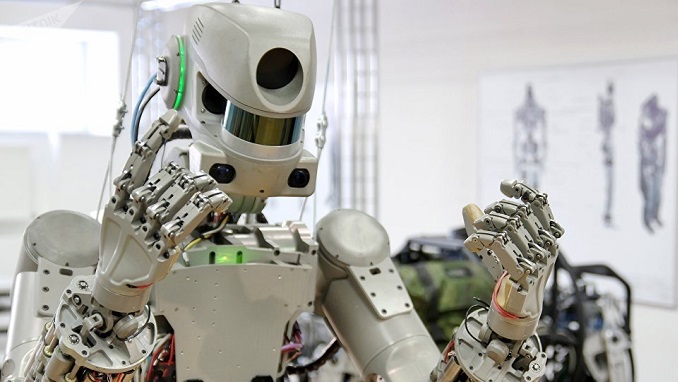An unmanned rocket carrying Russia’s life-size humanoid robot Fyodor was sent into space on Thursday to spend 10 days learning to assist astronauts on the International Space Station (ISS), TASS news agency reported.
Officially called “Final Experimental Demonstration Object Research” with identification number Skybot F850, the robot nicknamed Fyodor is the first ever sent up by Russia.
The robot blasted off in a Soyuz MS-14 spacecraft at 6:38 am Moscow time (0338 GMT) from Russia’s Baikonur cosmodrome in Kazakhstan. The Soyuz is set to dock with the space station on Saturday and stay till September 7.
Soyuz ships are normally manned on such trips, but on Thursday no humans are travelling in order to test a new emergency rescue system.
Instead of cosmonauts, Fyodor was strapped into a specially adapted pilot’s seat, with a small Russian flag in his hand.
“Let’s go. Let’s go,” the robot was heard as ‘saying’ during launch, apparently repeating the famous phrase by first man in space, Russia’s Yury Gagarin.
The silvery anthropomorphic robot stands 1.80 metres (5 foot 11 inches) tall and weighs 160 kilograms (353 pounds). Fyodor has Instagram and Twitter accounts that describe it as learning new skills such as opening a bottle of water. In the station, it will trial those manual skills in very low gravity.
“That’s connecting and disconnecting electric cables, using standard items from a screwdriver and a spanner to a fire extinguisher,” the Russian space agency’s director for prospective programs and science, Alexander Bloshenko, said in televised comments ahead of the launch.
“The first stage of in-flight experiments went according to the flight plan,” the robot’s account tweeted after reaching orbit.
Fedor copies human movements, a key skill that allows it to remotely help astronauts or even people on Earth carry out tasks while they are strapped into an exoskeleton.
Such robots will eventually carry out dangerous operations such as space walks, Bloshenko told state news agency RIA Novosti.












